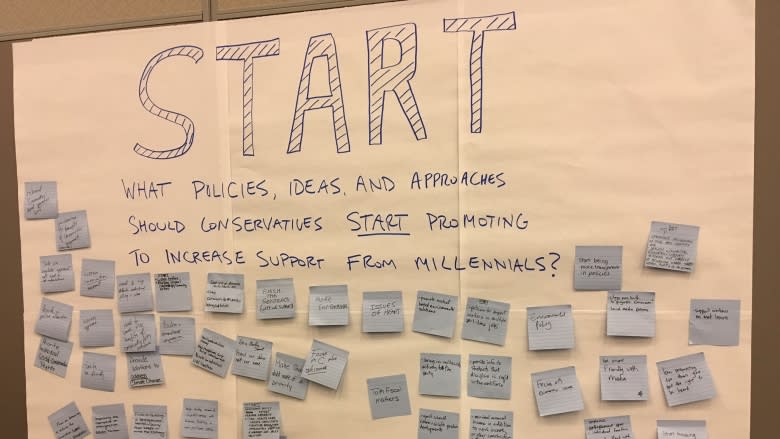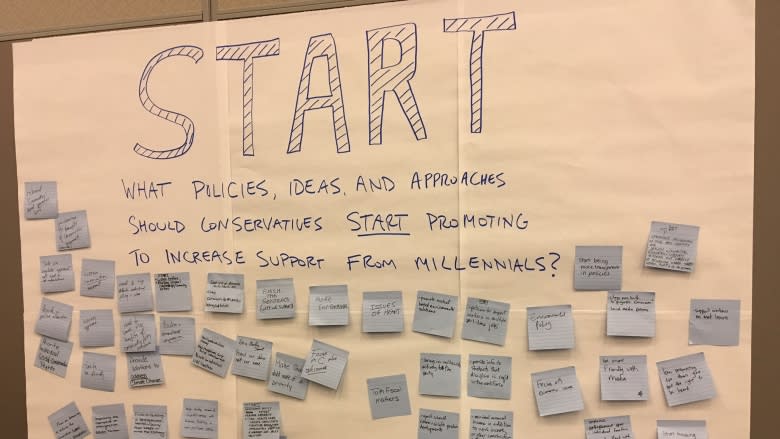Want millennial voters? Conservatives must change, researchers say
Researchers brought a sobering message to the annual convention of the right-leaning Manning Centre Friday: most voters under 35 aren't connecting with the conservative movement, and if it wants to reach them, more than just messaging needs to change.
Making Conservative policies more relevant to millennials — a younger demographic not consistently defined, but most often referring to voters under 35 — has preoccupied a federal party that doesn't want to sit on the Opposition bench for very long. Under interim leader Rona Ambrose, the Conservative caucus has been seized with this at recent strategy sessions.
But findings presented Friday to attendees of the conference, organized by the right-leaning think tank named after and spearheaded by Reform Party founder Preston Manning, outlined the scope of the gap between the conservative movement and the bulk of this demographic, which currently makes up about a quarter of Canada's population and more than a third of its work force.
Social conservatism? Forget it, that's for baby boomers, explained Heather Scott-Marshall from Mission Research, taking the audience through the findings of a national political values study conducted last October.
While some candidates for the leadership of the Conservative Party may think there's support to be gained by championing "Canadian values," that won't fly with this group, her research suggests.
"They don't want any great authority telling them which cultural values need to be favoured over other groups," she said
Her findings suggest younger voters strongly support minority rights and about half of the younger voters surveyed believed the government isn't going far enough to protect minorities.
"They do believe in a big tent and inclusivity — in as much as they trust themselves first, they want everyone to have an equal shot," she said.
"I think the message where we're declaring war on transgendered people and undocumented immigrants and religious minorities like Islamists is anathema to that group."
'Can't rely on free market'
Then there's the role of government.
Conservatives often campaign on spending cutbacks and champion the virtues of small, unobtrusive institutions. But that's not where millennial heads are at.
"They still have an appetite for strong government," she said. "They believe that government has a role in stabilizing the economy, in their job and economic futures. They don't want to see government get so small that it's not able to intervene."
Part of the reason may be this generation's precariousness: recently out of school, they're finding it hard to find steady, well-paying work and afford to buy homes.
Millennials believe "we can't just rely on the free market to take care of our most vulnerable groups," she said.
Scott-Marshall's research found trust in conservative political parties was low, with respondents reacting much better to the label "progressive" than the label "conservative."
Why? The conservative label makes them think of politics resistant to change, stuck in the past and favouring the rich, she said.
The news wasn't much better for the federal Conservatives when it came to current government policies: a majority of those surveyed favoured taxing the wealthy, legalizing marijuana and implementing a carbon tax.
Show up in the House of Commons and you'll hear Conservatives attacking the government for doing exactly those types of things, with a few exceptions.
Economic concerns top list
The findings weren't always consistent.
While the label "libertarian" scored very low with this demographic, the same survey said millennials are big on "individual rights."
The political values study may back up Conservatives who want their party to focus on jobs and the economy: the cost of living, jobs and the general state of the economy were top issues for younger voters.
Health care, an issue that has topped surveys of the general population, fell farther down the list, behind climate change and education.
The size of the national debt also registered as a major problem with millennials, Scott-Marshall said, suggesting a typically conservative policy plank that might register with this group.
The research also found millennials also respond positively to things like entrepreneurship and supporting small business.
More than re-branding
Ted Kouri, from the Edmonton-based marketing group Incite, said qualitative research his firm has done with interviews and group sessions in Alberta is consistent with Scott-Marshall's work.
Millennials are looking for positive, constructive messages, he advised, and they're turned off when criticism is offered without an alternative course of action.
While some of the work the conservative movement may need to do is about branding — "the decorating on the cake," Kouri called it — a party will fall short if it does only that, he warned.
"Look at the ingredients in the cake," he advised: engage with younger voters and develop new policies or run the risk of continuing to fail to connect.
After the researchers spoke, the audience for the panel — millennials appeared well-represented — was invited to break into small groups to discuss what the conservative moment needs to start doing, stop doing and continue doing.
As several other sessions continued simultaneously at the conference, Manning himself chose to join in the discussion at this one.




